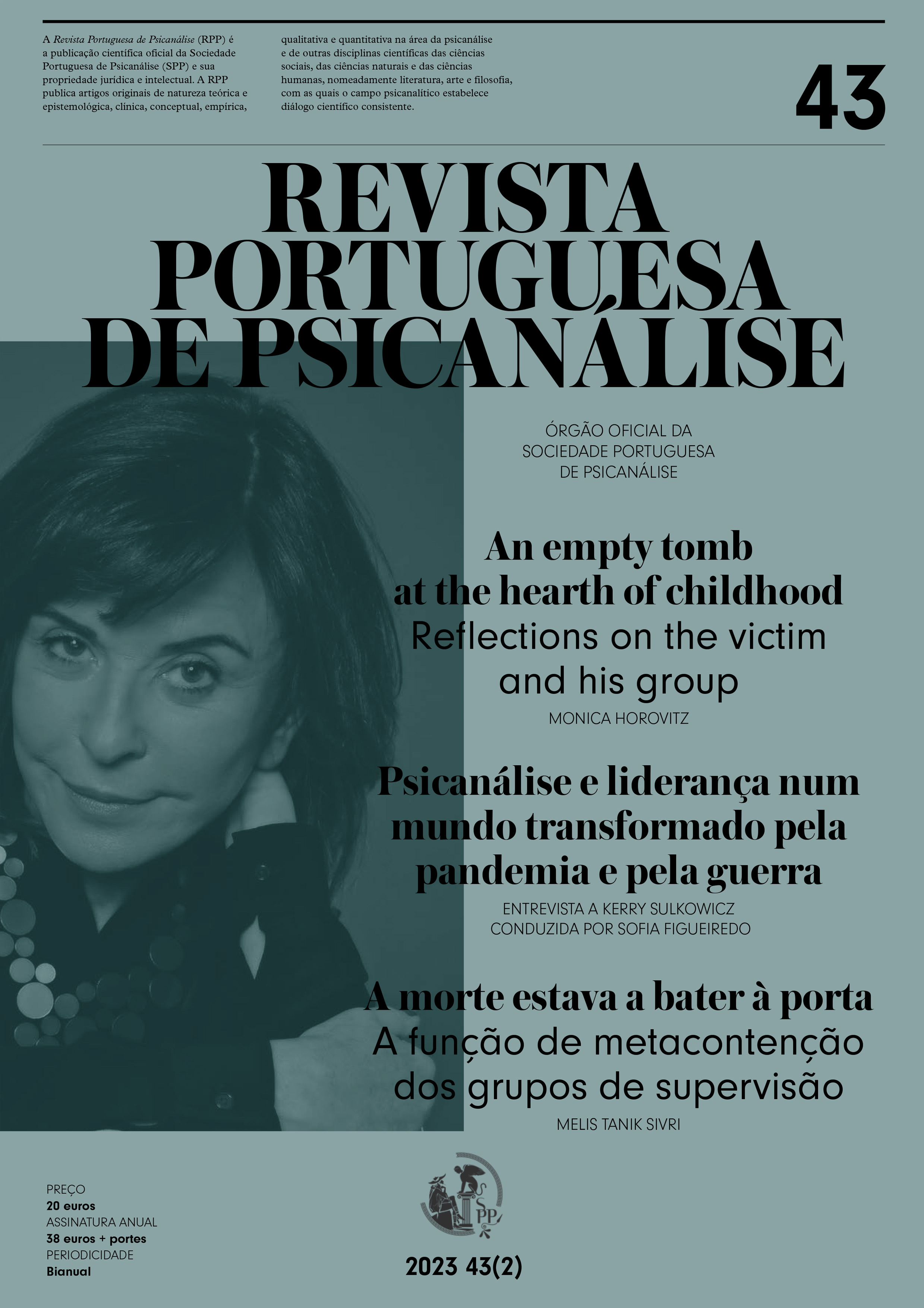Noite das palavras

Abstract
Night of the words
This article, whose title comes from a poem by Paul Celan, addresses how collective traumas affect the relacional, intersubjective and social foundations constitutive of the psyche, attacking the intrapsychic matrix representative of the empathic “I-you” dyad. The absence of the possibility of dialogue between the inner “I” and the inner “you” makes it impossible to symbolise the lived traumatic experience and to create narratives consigning the victims of collective traumas to the “night of words”. Clinical work with these patients requires “an empathic and passionate therapist”, who enhances the mending of the destroyed relational web of “I -you” and who simultaneously recognises the historical truth experienced. But the individual psychic work is not independent of the collective memory and psychic elaboration, it relies on them, feeds on them (and nourishes them). The subject who has been violated in his or her internal space, and also in the shared common space, cannot do without the recognition and the inscription, by the community, of what really happened. And the emergence, in the social network, of the polyphony of multiple narratives, similar and different, mobilises figurative and representative functions, both in the individual and in the collective, for what, formless and lacunar, seemed unspeakable.
Keywords
collective trauma, internal dialogue, denial pact, latence period
Author Biography
Maria Antónia Carreiras
Psicóloga Clínica, doutorada em Psicologia Clínica. Docente universitária. Psicanalista, membro da Sociedade Portuguesa de Psicanálise (SPP) e da Associação Internacional de Psicanálise (IPA).
References
- Améry, J. (1995). Par-delà le crime et le châtiment. Essai pour surmonter l’insurmontable. Actes Sud. (Original publicado em 1966.)
- Antelme, R. (2003). A espécie humana. Ulisseia. (Original publicado em 1957.)
- Auerhahn, N., Laub, D., & Peskin, H. (1993). Psychotherapy with Holocaust survivors. Psychotherapy: theory, research, practice, training, 30(3), 434–442.
- Aulagnier, P. (1991). La violence de l’interprétation – Du pictogramme à l’énoncé. PUF. (Original publicado em 1975.)
- Blanchot, M. (1969). L’entretien infini. Gallimard. Carreiras, M. A. (2005). Da criação e da morte – Peregrinação pela obra de Paul Celan. Tese de doutoramento apresentada na Universidade de Coimbra.
- Celan, P. (1993). Sete rosas mais tarde – Antologia poética (Seleção, tradução e introdução de João Barrento eY. K. Centeno). Cotovia. (Original publicado em 1959.)
- Chalamov, V. (2008). Récits de la Kolyma. Éditions Verdier. (Original publicado em 1978.)
- Felstiner, J. (1995). Paul Celan – Poet, survivor, jew. Yale University Press.
- Fortin, B. (2015). Éditorial. Le Coq-Héron, 220, 7–8.
- Freud, S. (1930/2002). La malaise dans la culture. Oeuvres complètes, XVIII, 245–333. PUF.
- Gampel,Y. (1985). Ces parents qui vivent à travers moi. Dunod.
- Green, A. (1990). La folie privée – Psychanalyse des cas-limites. Gallimard.
- Grubrich Simitis, I. (2008). Reality testing in place of interpretation: a phase in psychoanalytic work with descendants of holocaust survivors. Psychoanalytic quarterly, 79(1), 37–69.
- Kaës, R. (1989). Ruptures catastrophiques et travail de la mémoire. Em J. Pujet & R. Kaës (Eds.), Violence d’État et Psychanalyse (pp. 169–204). Dunod.
- Kaës, R. (2009). Les aliances inconscients. Dunod. Kaës, R. (2015). Le travail psychique de la mémoire dans les traumas collectifs. Trabalho apresentado na Giornata della Memoria, Milão.
- Kertész, I. (2003). Sem destino. Editorial Presença. Klemperer, V. (1975/1996). LTI, la langue do III Reich. Albin Michel.
- Laub, D. (2015). Le défaut d’empathie. Le Coq-Héron, 220, 29–47.
- Levi, P. (1988). Se isto é um homem. Teorema. (Original de 1958.)
- Levi, P. (1989). Les naufragés et les rescapés. Gallimard. (Original de 1986.)
- Mascolo, D. (1987). Autour d’un effort de mémoire – Sur une lettre de Robert Antelme. Maurice Nadeau.
- Meltzer, D.; Bremner, J.; Hoxter, S.; Weddell, D. & Wittenberg, I. (1980). Explorations dans le monde de l’autisme. Payot. (Original publicado em 1975.)
- Orwell, G. (1949/2007). 1984. Antígona. Réfabert, P. (2001). De Freud à Kafka. Calmann-Lévy.
- Rosenblum, R. (2000). Peut-on mourir de dire? Revue française de psychanalyse. 64(1), 113–137.
- Roussillon, R. (1987). Le traumatisme perdu. Bulletin de la Société Psychanalytique de Paris, 12, 27–38.
- Sebald,W. G. (2017). História natural da destruição. Quetzal Editores. (Original publicado em 2001.)
- Stewart, S. (2009). Mémoire de l’inhumain – Du trauma à la créativité. CampagnePremière.
- Sykes, R. W. (2022). A nossa família – Vida, amor, morte e arte dos neandertais. Relógio d’Água.
- Weil, E. (2000). Silence et latence, Revue française de psychanalyse, LXIV, 1, 169–179.
- Wiesel, E. (1990). From the kingdom of memory: reminiscences. Simon and Schuster.
- Zaltzman, N. (1998). De la guérison psychanalytique. PUF.